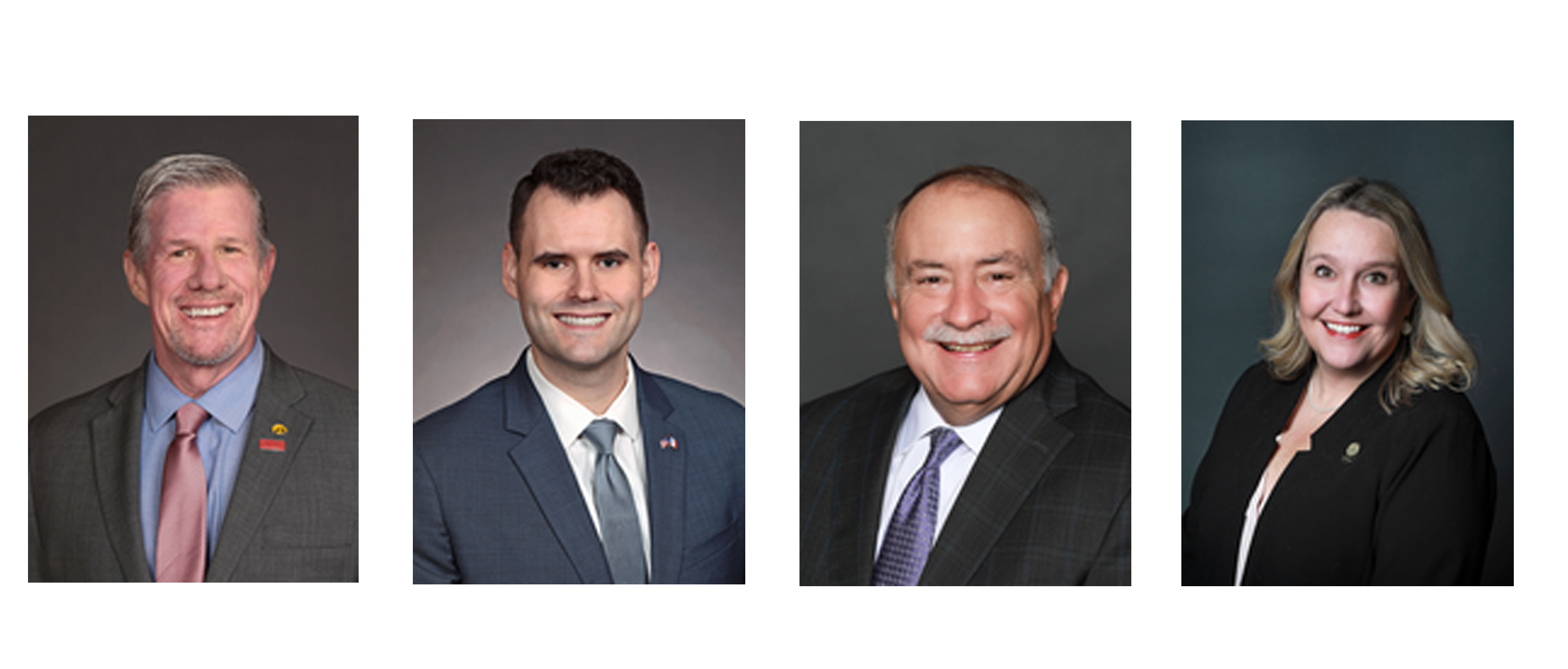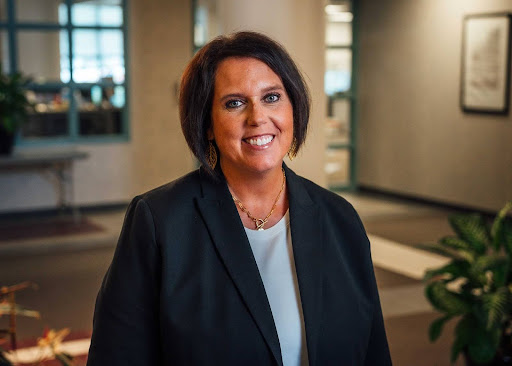Workforce the focus of 2022 session, lawmakers say during Partnership breakfast

MICHAEL CRUMB Dec 8, 2021 | 9:16 pm
6 min read time
1,416 wordsAll Latest News, Government Policy and LawFrom left: Sen. Brad Zaun, Sen. Zach Wahls, Rep. Brent Siegrist, Rep. Jennifer Konfrst.
Issues surrounding workforce development will be the focus of the 2022 Iowa legislative session, according to lawmakers who participated in the Greater Des Moines Partnership’s legislative breakfast where the organization unveiled its agenda for the session that begins on Jan. 10.
Lawmakers who participated in the forum were Senate President Pro Tem Brad Zaun, R-Urbandale, Senate Minority Leader Zach Wahls, D-Coralville, House Assistant Majority Leader Brent Siegrist, R-Council Bluffs, and House Minority Leader Jennifer Konfrst, D-Windsor Heights.
The Partnership’s featured priorities include state funding for the Des Moines International Airport terminal project, addressing the workforce shortage, supporting a tax structure that encourages business growth and protects existing tax exemptions and economic development tools, community placemaking, child care, housing, and broadband.
Many of the issues will carry over from last year, such as improving access to affordable child care, continued expansion of high-speed internet, tax reform and making sure Iowa is a welcoming state for everyone.
Zaun said tax reform, including the elimination of the state income tax, will be a priority for Senate Republicans in 2022.
“I do believe that would be one of the biggest tools to attract people to Iowa if we could get that done,” he said. “I think it would be a huge step for the state of Iowa if you do not have to pay income tax in the state of Iowa.”
Zaun said lawmakers also need to review the state’s tax credits, and look to increase funding for mental health services.
Siegrist said while lowering Iowa’s corporate tax rate will be on the agenda in 2022, the state’s tax credits “are pretty robust.”
“Republicans recognize that the corporate tax rates are a little higher than they should be. However, you also have to compare apples to apples and look at those tax credits the state is offering,” he said. “You can’t just always look at the tax rates, because there are some other things that mitigate some of those higher rates by reducing your tax burden elsewhere.”
Both Siegrist and Zaun cited a budget surplus of $2 billion — a mix of economic growth and federal coronavirus relief funds — as a source of revenue lawmakers could tap to pay for programs and services.
Wahls said Democrats are open to looking at the tax code and recognize that having a competitive tax rate is important to the state’s ability to attract new workers and investments, “but the devil is always in the details.”
“If we’re talking about taxes, it’s going to be hard to lower the corporate tax rate, abolish the income tax and pass the sales tax increase at a time when prices are already high for consumers, I don’t know how we’re going to do all of that,” he said.
Zaun said he doesn’t see “an appetite” to raise the sales tax in 2022.
“Having a conversation about tax credits is something we’ve talked about for years,” he said. “I think it’s something we should do on a regular basis and see how effective these are. We’re not interested in raising taxes. Having a conversation about eliminating tax credits would mean potentially where we would not have to raise the sales tax to do a complete elimination of the income tax.”
Konfrst said lawmakers need to find a way to address taxes without only raising them on people who pay sales taxes.
“We have to find a way to make sure that any proposal we have doesn’t just affect those who are less affluent in its implementation,” she said. “I hope what we’re looking at is addressing middle-class taxes and finding a way for workers to actually get the benefits of these tax cuts for a change. I think it’s pretty important to realize that when you’re talking about cutting a lot of taxes and raising a sales tax, the impact of that is disproportionately on the working poor — and I think that is unacceptable.”
All four lawmakers agreed that more needs to be done to create access to affordable child care in Iowa, building on legislation in 2021 that increased income limits to qualify for child care assistance and increased reimbursement rates for child care providers.
“If you look at the states in terms of households that have all parents who work outside the home, Iowa is at the top of that list, so child care is a unique need in our state relative to a lot of other states and we do have to make those investments and they’re not going to happen for free,” Wahls said.
Siegrist said the Legislature needs to look at tax credits for businesses who open child care centers on-site, and provide assistance for the rehabilitation of old child care centers.
Konfrst said more also needs to be done to increase pay for child care workers.
“We know it’s very hard to work in child care because the pay isn’t great,” she said. “We all pay a lot for child care, but the pay isn’t great and people can go work at large warehouse stores and get much better pay. We need to pay for child care. We need to make sure that the people caring for our children are paid adequately, so we think wages are a really important element there as well.”
There was also consensus that Iowa needs to build on legislation adopted during the last session to expand broadband access across the state, both in rural areas and urban areas where access to high-speed internet is lacking.
Wahls said part of that should be updating how the state funds the Office of the Chief Information Officer.
“The way we fund that office is very out of date, so that office unfortunately is always being asked to do more than it has resources to do with, so I would love to … change the way we fund that office so they can meet the needs of not just state government but make sure we’re guiding those investments that are going to benefit all Iowans, both public and private sector.”
Konfrst said the state also needs to work to ensure broadband is affordable.
“Paying for broadband is no longer an option,” she said. “We need to look at affordability, too, and that means working with our partners in the private sector to make sure that they understand the impact of what we’re doing and the opportunities that we’re providing by helping them expand broadband in the state and working with them on making sure they’re providing affordable service, too.”
The lawmakers also were in consensus on the importance of supporting placemaking initiatives, such as the ICON Water Trails, and arts and culture.
Wahls and Konfrst also said the state needs to ensure that Iowa is a welcoming place for all and avoid divisive legislation that tarnishes the state’s image and makes it appear to be unwelcoming for new residents and businesses.
“Iowa’s brand gets damaged when stories are out there about things that fringe elements in the state are doing or proposing,” Konfrst said. “I think it’s critically important that we make sure that our brand continues to be strong, and that’s really what I’m advocating for.”
The lawmakers were also asked about housing and what the Legislature might do to increase housing in the state.
Wahls tied the housing question into the conversation about racial equity in Iowa and said more needs to be done to close the homeownership gap between white residents and people of color in Iowa.
“Iowa has the sixth-largest gap between Black and white Iowans when it comes to homeownership in the United States of America, so when we want to talk about racial equity, this is an issue I would love to see the Legislature focus on, trying to make sure we’re doing our part to close that gap so that Iowans of every race and ethnicity have equal opportunity for the American dream.”
While there was general agreement that more needs to be done, Zaun appeared to be in disagreement, saying he “believes in the market.”
“I think things are going pretty well. … I see a lot of housing going up,” he said. “There comes a point where we have to prioritize things. I’d rather put money into mental health. I’m a believer that the people in the industry and in the metropolitan area, it’s getting done. I believe the market needs to decide that.”











